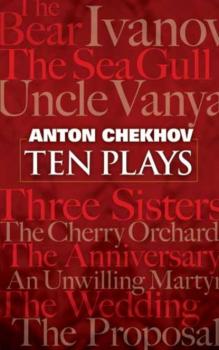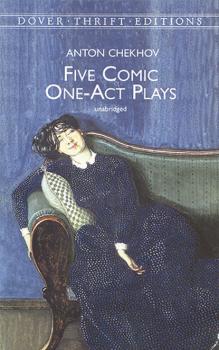Anton Chekhov
Список книг автора Anton ChekhovThe Wife and Other Stories
Anton Chekhov (1860-1904) was a master of the short story. The son of a former serf in southern Russia, he attended Moscow University to study medicine, writing short stories for periodicals in order to support his family. What began as a necessity became a legitimate career in 1886 when he was asked to write in St. Petersburg for the Novoye Vremya (New Times), owned by millionaire magnate Alexey Suvorin. Chekhov began paying more attention to his writing, revising and developing his own principles and conceptions of truth, for a time coming under the influence of Leo Tolstoy. As a result of his widespread popularity, Chekhov amassed a vast collection of short stories displaying an early use of stream-of-consciousness writing, as well as his powerful ideas concerning the individual, the tedium of life, and the beauty nature and humanity. This edition contains «The Wife,» «Difficult People,» «The Grasshopper,» «A Dreary Story,» «The Privy Councilor,» «A Man in a Case,» «Gooseberries,» «About Love,» and «The Lottery Ticket.»
Uncle Vanya
Originally published in 1898 and performed for the first time in Moscow in 1899, “Uncle Vanya” is widely considered one of Russian playwright Anton Chekhov’s most important dramas. It is the tale of the visit of Serebryakov, a retired professor and his new, young wife, Yelena, to the rural estate that had belonged to Serebyrakov’s late first wife and that supports the couple in their urban lifestyle. The estate is run by Serebryakov’s adult unmarried daughter, Sonia, and her Uncle Vanya, brother to the late first wife. Essentially a reworking of another Chekhov play from a decade earlier, “The Wood Demon”, “Uncle Vanya” is a melancholic study in bitterness and regret as the characters reflect on their respective failures to accomplish their lives’ ambitions. Tensions and resentments boil over and Uncle Vanya is pushed to his breaking point when Serebryakov considers selling the estate so he may put the money in more lucrative investments with no thought to the lives he will displace in the process. A classic tragicomedy, “Uncle Vanya” has been praised as one of Chekhov’s most important plays ever since its first performance and continues to be revered and studied to this day. This edition follows the translation of Marian Fell and includes a biographical afterword.
The Cherry Orchard
Written in 1903, “The Cherry Orchard” was Anton Chekhov’s final play, widely regarded as one of his greatest dramatic accomplishments. It is a story set during the decline of the aristocracy and the rise of an emergent middle class in Russian society at the turn of the 20th Century. Madame Ranevsky and her daughters have returned to their family estate, including its famous cherry orchard, to oversee the auction of the estate in order to pay the mortgage. Madame Ranevsky is paralyzed by the thought of losing the sentimental cherry orchard and all that the loss of the family estate represents and has no grasp of the financial and legal issues she faces. Rather than see her family’s property divided and sold off so that she can keep a small piece of it, it is instead sold to the son of a former serf. Ultimately the now destitute family leaves to the sound of the beloved orchard being chopped down, the symbolic and metaphoric end to an era. The vast social and financial upheaval at the end of the 20th century in Russia, which ultimately led to the Socialistic Revolution, is excellently portrayed in Chekhov’s “The Cherry Orchard.” In turns melancholy and comedic, this timeless dramatic masterpiece continues to move audiences to this day. This edition includes a biographical afterword and follows the translation of Julius West.
The Cherry Orchard and Other Plays
Collected in this volume are five of Chekhov’s most popular dramatic works: “Ivanov”, “The Sea-Gull”, “Uncle Vanya”, “Three Sisters” and “The Cherry Orchard”. Firstly in “Ivanov” we find the taut psychological drama of Nikolai Ivanov, a man who is severely conflicted by the illness of his wife, his mounting debts, and his own internal desires. Secondly, “The Sea-Gull” is the story of the romantic and artistic conflicts between four main characters: Nina, the daughter of a wealthy landowner; Madame Irina Arkadina, a once leading actress; Konstantin Treplyov, her son and a playwright; and Trigorin, a well-known writer. Thirdly, “Uncle Vanya” is a melancholic portrait of a cast of characters examining their respective miseries and failures to accomplish in their lives that which they might have hoped to. Fourthly, “Three Sisters” is a story which concerns the lives of an aristocratic family, the Prozorovs, who struggle to search for meaning in the modern world. Lastly “The Cherry Orchard” is the tale of an aristocratic Russian woman and her family who return to their estate, a cherry orchard, to oversee its auction in order to pay the mortgage. Taken together this collection of dramas exhibits Chekhov’s literary prowess and provides a brilliant portrait for the dramatic social environment of Russia at the turn of the 20th century. This edition follows the translations of Marian Fell and Julius West and includes a biographical afterword.
Ward No. 6 and Other Stories (Translated by Constance Garnett)
Anton Chekhov, who is often credited with inventing the modern short story, wrote many volumes worth of stories during his lifetime. Considered by many as one of the greatest short story writers of all time, Chekhov’s extraordinary storytelling gift is exemplified in this volume of twenty-three of his most popular stories. “Ward No. 6 and Other Stories” includes the following stories: “The Cook’s Wedding”, “The Witch”, “A Dead Body”, “Easter Eve”, “On the Road”, “The Dependents”, “Grisha”, “The Kiss”, “Typhus”, “The Pipe”, “The Princess”, “Neighbours”, “The Grasshopper”, “In Exile”, “Ward No. 6”, “Rothschild’s Fiddle”, “The Student”, “The Darling”, “A Doctor’s Visit”, “Gooseberries”, “The Lady with the Dog”, “In the Ravine”, and “The Bishop”. This edition follows the translations of Constance Garnett.
Selected Stories of Anton Chekhov
Anton Chekhov was a master of the short story. The son of a former serf in southern Russia, he attended Moscow University to study medicine, writing short stories for periodicals in order to support his family. What began as a necessity became a legitimate career in 1886 when he was asked to write in St. Petersburg for the Novoye Vremya (New Times), owned by publishing magnate Alexey Suvorin. Chekhov began paying more attention to his writing, revising and developing his own principles and conceptions of truth, for a time coming under the influence of Leo Tolstoy. As a result of his widespread popularity, Chekhov amassed a vast collection of short stories displaying an early use of stream-of-consciousness writing, as well as his powerful ideas concerning the individual, the tedium of life, and the beauty of nature and humanity. Twenty-eight stories are collected here in the “Selected Stories of Anton Chekhov” including many of the author’s most popular shorter works. This edition includes a biographical afterword.
The Sea-Gull
Written in 1895 and first performed in 1896, “The Sea-Gull” is widely hailed as the first of Anton Chekhov’s four most important plays. It is acclaimed for its brilliant use of subtext and remains widely studied and performed as a significant dramatic work. It is the story of the romantic and artistic conflicts between four main characters: Nina, a young, aspiring actress and the daughter of a wealthy landowner; Madame Irina Arkadina, once a great leading actress; Konstantin Treplyov, her son and a playwright; and Trigorin, Irina’s lover and a well-known writer. While Chekhov intended that the play be more comedic in tone, it is often performed and interpreted as a subtle and nuanced tragedy, full of doomed romances, frustrated artistic ambitions, loneliness, and regret. “The Sea-Gull” is frequently adapted for stage and screen and the roles of Nina, Irina, Konstantin, and Trigorin are famous for the subtle depths of emotion the parts call for. Over a century after it was first performed, “The Sea-Gull” remains a theatrical masterpiece and the work that established Chekhov’s reputation as a brilliant playwright. This edition follows the translation of Marian Fell and includes a biographical afterword.
Ten Plays
Here in one compact and modestly priced edition are the celebrated Russian playwright's most popular works. In addition to five full-length plays—The Sea Gull, Uncle Vanya, The Three Sisters, The Cherry Orchard, and Ivanov—this anthology features five of Anton Chekhov's one-act comedies: The Anniversary, An Unwilling Martyr, The Wedding, The Bear, and The Proposal.Chekhov's taste for vaudeville shows and French farces influenced his comic one-acts, which are widely regarded as masterpieces of the genre. His greatest fame rests upon his full-length tragedies, which focus on mood and characterization rather than plot. Chekhov considered his famous tragedies a form of comic satire—with the bleakness of life in czarist Russia at the turn of the twentieth century as their central joke. «All I wanted was to say honestly to people: 'Have a look at yourselves and see how bad and dreary your lives are!'» explained the playwright. In addition to their enduring emotional and intellectual appeal to audiences, Chekhov's modern realist dramas continue to influence theatrical literature and performance.
Five Comic One-Act Plays
One of the foremost dramatists of the 19th century, Russian author Anton Chekhov (1860–1904) created a body of work noted for its realistic dialogue and keen insights into human relationships. This collection of five one-act plays — in the celebrated Constance Garnett translations — shows Chekhov at his witty best.The Anniversary takes a lively look behind the frenetic scenes at a bank: a man overburdened with errands from friends and family gives a nearly maddened but ludicrous account of his chores and obligations in An Unwilling Martyr; and The Wedding depicts scenes from a wedding reception in which the mother of the bride assumes affected airs and deals with quarrelsome guests. In The Bear, a virtuous, spirited widow is pressed to repay a debt and ends up receiving an offer of marriage. The Proposal depicts the trauma of a would-be suitor who winds up in a wrangle over property.Theater lovers, students of drama and literature, and other readers, as well as amateur and professional groups performing these popular works, will welcome this convenient, inexpensive collection of comic gems by one of the masters of modern drama.
The Cherry Orchard
The Cherry Orchard was first produced by the Moscow Art Theatre on Chekhov's last birthday, January 17, 1904. Since that time it has become one of the most critically admired and performed plays in the Western world, a high comedy whose principal theme, the passing of the old semifeudal order, is symbolized in the sale of the cherry orchard owned by Madame Ranevsky.The play also functions as a magnificent showcase for Chekhov's acute observations of his characters' foibles and for quizzical ruminations on the approaching dissolution of the world of the Russian aristocracy and life as it was lived on their great country estates. While the subject and the characters of the work are, in a sense, timeless, the dramatic technique of the play was a Chekhovian innovation. In this and other plays he developed the concept of «indirect action,» in which the dramatic action takes place off stage and the significance of the play revolves around the reactions of the characters to those unseen events.Reprinted from a standard edition, this inexpensive well-made volume invites any lover of theater or great literature to enter the world of Madame Ranevsky, Anya, Gayef, Lopakhin, Firs, and the other memorable characters whose hopes, fears, loves, and general humanity are so brilliantly depicted in this landmark of world drama.









